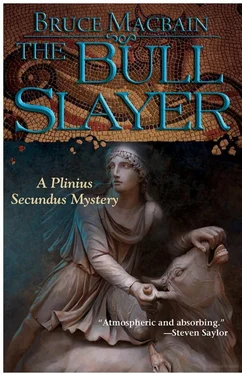Bruce Macbain - The Bull Slayer
Здесь есть возможность читать онлайн «Bruce Macbain - The Bull Slayer» весь текст электронной книги совершенно бесплатно (целиком полную версию без сокращений). В некоторых случаях можно слушать аудио, скачать через торрент в формате fb2 и присутствует краткое содержание. Жанр: Исторический детектив, на английском языке. Описание произведения, (предисловие) а так же отзывы посетителей доступны на портале библиотеки ЛибКат.
- Название:The Bull Slayer
- Автор:
- Жанр:
- Год:неизвестен
- ISBN:нет данных
- Рейтинг книги:3 / 5. Голосов: 1
-
Избранное:Добавить в избранное
- Отзывы:
-
Ваша оценка:
- 60
- 1
- 2
- 3
- 4
- 5
The Bull Slayer: краткое содержание, описание и аннотация
Предлагаем к чтению аннотацию, описание, краткое содержание или предисловие (зависит от того, что написал сам автор книги «The Bull Slayer»). Если вы не нашли необходимую информацию о книге — напишите в комментариях, мы постараемся отыскать её.
The Bull Slayer — читать онлайн бесплатно полную книгу (весь текст) целиком
Ниже представлен текст книги, разбитый по страницам. Система сохранения места последней прочитанной страницы, позволяет с удобством читать онлайн бесплатно книгу «The Bull Slayer», без необходимости каждый раз заново искать на чём Вы остановились. Поставьте закладку, и сможете в любой момент перейти на страницу, на которой закончили чтение.
Интервал:
Закладка:
Pliny unrolled it and read. “Well. The Golden Mouth is inviting me to his country estate to discuss the affairs of the province with him and his friends. He promises pleasure as well as business.”
“I’d rather be thrown into a pit of snarling dogs. Will you go?”
“I don’t see how I can refuse.”
“I’ll come with you, help bear the brunt.”
“No, you stay here.”
“Gaius, you’re not well.”
“I’ll take Marinus with me, I’ll be fine.”
“And me, Patrone?” Zosimus had lingered by the door, listening.
“Thank you, my boy.” Again, thank you! “Perhaps you’d rather stay with Ione and-” He’d almost said your son .
“No sir, I would not.”
***
The following morning the procession of carriages carrying Pliny, his attendants and lictors , and the heap of gifts that protocol demanded departed from Nicomedia in a swirl of dancing snowflakes. This was his first visit to Diocles’ estate and as they proceeded, guided by the messenger, he saw with surprise that they were heading in the same direction as the cave of Mithras, only veering off on another road while still some miles away.
Pliny owned fine estates in Italy and considered himself knowledgeable about their management. Diocles’ well-tended acres impressed him. Fruit and olive orchards; fields of wheat and barley, in stubble now after the harvest; woods full of game; barns and slave barracks in good repair. And the mansion, large and beautifully proportioned, fronted by Ionic columns of pink marble.
Diocles-his bantam cock’s chest thrust out and large, leonine head tilted back-stood in the doorway and hailed him in his thrumming baritone. “We’re all waiting for you, Governor, come in. So glad you could honor us with your presence. Philemon,” he addressed his major domo, who hovered at his shoulder, “see that the governor’s retinue are escorted to the servants’ quarters.”
Instantly Pliny was separated from his lictors , from Zosimus and Marinus, as Diocles ushered him into a vast and crowded dining hall that buzzed with conversation. Pliny guessed there must be thirty guests or more, the elite of Nicomedia and nearby Prusa. The big landowners, the richest merchants, city councilors and magistrates, the priests of the great temples-all summoned at short notice by this one man. It was unmistakable how they all deferred to him. Not for the first time, an image presented itself to Pliny’s mind of a spider sitting at the center of its web; a taut and sensitive network whose filaments were built of obligation and influence, of favors owed and favors promised. Most of these men he knew, if only slightly. One face in the crowd surprised him-Pancrates. What was that hustling charlatan doing in this sleek and well-fed company? He acknowledged him with a nod.
Diocles entertained like a prince. An army of servants scurried back and forth, bearing course after steaming course of rich food-roast crane and boar, broiled eel and mullet, sow’s womb and hare’s liver, blood sausage and milk-fed snails, fricassee of veal, truffles in wine sauce, and all of it seasoned with coriander and cumin, fenugreek and silphium and garum . Pliny had no appetite for any of it, but ate what politeness demanded. He had no appetite either for the young hetaera who reclined beside him and attempted witty conversation. There were more than a dozen attractive women in the company-none of them anyone’s wife. Diocles’ womenfolk were confined to the gynekeion at the back of the house and never seen by strangers
The laughter was forced, the conviviality ice-thin. Diocles’ golden throat delivered an unending string of sententious dicta on philosophy, morality, and the virtues of simplicity, all adorned with quotations from Homer and other poets. Pliny had never felt more alone. The absence of Calpurnia from his side was an aching wound.
When at last the dishes were cleared away and the hetaeras dismissed, the synposion began, the serious drinking and serious conversation. After the Greek fashion, wine was mixed with water in a gigantic bronze krater of beautiful workmanship and shallow drinking bowls handed round. Pliny had already drunk too much; with an effort he focused his mind. He needed to be sharp now, careful, alert. He, who had interrogated so many in the past weeks, was now to be interrogated.
Why was their friend Didymus under arrest? Surely the charge of murder was preposterous. Had he been tortured into confessing? Were others to be entrapped like this? Were any of them safe? Was Pliny not overstepping his authority? Had the emperor been consulted? The voices grew louder, more insistent, veering close to insolence. Diocles himself was uncharacteristically silent, letting the others talk; his lips relaxed in a half-smile, his gaze fixed on Pliny like a spectator at a bearbaiting.
The hour grew late and Pliny felt his strength ebbing away, his self-control wearing dangerously thin. At last Diocles called a halt. “I’m afraid we’re wearying our guest. Where are our manners? Let us retire for the night. We need our rest because tomorrow I have a treat in store for you all. My woods are well stocked with wild pig, you ate a couple of them tonight, but there’s one old tusker out there, he’s wily and fast and he defies me. Tomorrow we hunt him.” He cast a beaming eye on Pliny. “The emperor is a keen boar hunter, I’m told. And you, governor, are no stranger to the sport, or so you say in one of your delightful letters. You see, I know more about you than you think I do.”
Pliny’s heart sank.
Diocles’ smile was wolfish. And then it froze. The room was suddenly very quiet. Pliny looked round to see what was the matter.
An old man had entered the hall. Tiny, wizened, wearing only one sandal, his soiled cloak trailing the ground behind him, his milky eyes staring vacantly. Diocles rushed to him. “Father!”
An elderly slave woman ran in. “Forgive me, master, he wandered, I didn’t see where-”
“It’s all right, Antiope.” Diocles recovered himself quickly. “So glad you decided to join us, father. We’re entertaining the governor tonight, did you know that? Would you like to meet him?” He spoke to him as one would speak to a child. He turned to Pliny. “Governor, my father, Hypatius.”
Hypatius? thought Pliny. Where have I heard that name ?
Chapter Forty-three
The 5th day before the Nones of December
Calpurnia sits alone in her room. Not her room, a strange room in a distant wing of the palace, her prison cell, though there are no bars or locks. She drinks wine laced with valerian root, hoping to sleep, but it doesn’t help. She tries to draw but can’t, tries to read but throws the book aside. Finally, she takes up her distaff and spindle and spins thread hour after hour, teasing out the wool with her fingers, watching the whorl spin this way, that way, with no purpose but to find oblivion in that simple, mindless activity. It is the seventh day since she and Agathon were caught in the cave, the fifth since she and Pliny and Ione and Zosimus shed each other’s heart’s blood in a mutual wounding that will scar them forever.
In all these weary days she has not seen a friendly face. Her new serving women are strangers to her. Ione is not permitted to come near her now-not that she wants her to. None of the wives have called on her-mercifully. No one will risk offending her husband by befriending her. She thinks bitterly how Agathon deceived and abandoned her. Is anything left of her passion for him? It feels now as if it had all happened to some other woman, someone she doesn’t even recognize. She has gathered together the dozens of drawings she made of him and has burned them one by one until nothing remains but a heap of ashes.
Читать дальшеИнтервал:
Закладка:
Похожие книги на «The Bull Slayer»
Представляем Вашему вниманию похожие книги на «The Bull Slayer» списком для выбора. Мы отобрали схожую по названию и смыслу литературу в надежде предоставить читателям больше вариантов отыскать новые, интересные, ещё непрочитанные произведения.
Обсуждение, отзывы о книге «The Bull Slayer» и просто собственные мнения читателей. Оставьте ваши комментарии, напишите, что Вы думаете о произведении, его смысле или главных героях. Укажите что конкретно понравилось, а что нет, и почему Вы так считаете.












